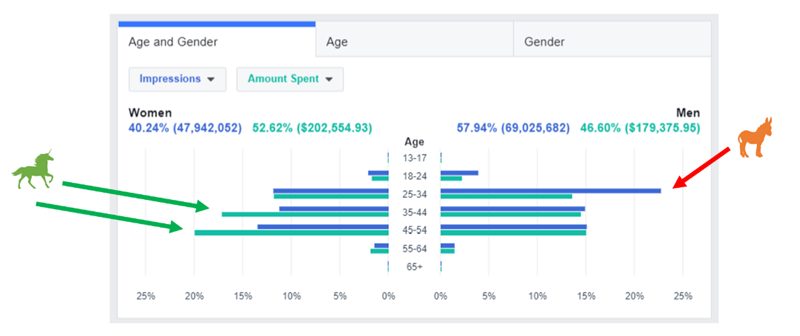Custom audience targeting is the crown jewel of Facebook Ads. Nothing else in our arsenal of ad targeting weapons comes remotely close to custom audiences in terms of raw ad-targeting power.

Sadly, though, most of the Facebook advertiser accounts I audit fail to realize the full power that Customer Audiences have to offer.
Today, I want to quickly illustrate my top three hacks to get 200-300% more value out of your custom audience targeting methods.
Facebook Custom Audience Hack #1: Find & Eliminate Donkey Audiences
When I analyze your Facebook custom audiences, I usually see a mixed bag of donkeys and unicorns.
If you haven’t been following me for a while, you might be wondering what the heck I’m talking about. Here’s what I mean by donkeys and unicorns. A marketing unicorn is one of those magical campaigns that’s so effective it performs in the top 1-3% of all marketing campaigns. The donkeys, on the other hand, are the average to below-average performers that aren’t doing anything to move the needle.
To boost our Facebook ad performance, we’ll need to eliminate some of the donkeys. They’re dragging your overall average down!
How do we do it?
Using the various ad and audience insight tools provided by Facebook. They’re basically a laser-guided donkey detector for your Facebook Custom Audiences!

Take, for example, the following audience insights from a real-life advertiser of productivity software:

Note that:
- Women ages 35-44 and women 45-54 are substantially more likely to engage with this business’s ads than any other age/gender cohort. These are their unicorn-audiences, the very best performing demographic.
- Men, across the board, accrue 57.94% of impressions but account for only 46.6% of the engagement (note: Facebook is a pay-per-engagement ad platform, so spend = engagement). Men 25-34 are their donkey audience, as they are the least likely to engage.
What do we do with this fantastic audience insight?
Eliminate the men from your ad targeting!
It might sound a bit drastic, but the problem with Facebook ads is that they’re not free. We want to make sure that every dollar spent yields the most bang for your buck, so you’re going to need to be a bit picky as to who you serve your ads to.
Heck, if budget is tight, eliminate the women between 13-24, 55-64, and 65+, too.
9 times out of 10, advertiser budgets are smaller than the massive audiences Facebook allows you to target, therefore when it comes to audience definitions, focus on your unicorns (the most engaged, best performing audiences) and eliminate your donkeys (the low-engagement duds).
(Note: If you have enormous use-it-or-lose-it ad budgets, or are under pressure to yield more conversions regardless of cost-per-conversion, feel free to ignore this advice.)
Facebook Custom Audience Hack #2: Unicorn-ification
An alternative to donkey elimination is to try to convert a donkey audience into a unicorn audience by changing the ad.

The following is a Facebook audience insight for a real-world advertiser of high-end electronics equipment. The grey bars in the background represent the relative abundance of the selected cohort on Facebook overall. The blue bars represent the distribution of the advertiser’s customers (via their custom audience).

Notice how:
- 89% of the purchases are from men.
- Of those purchases, most (85%) come from ages 35-44, 45-54 and 55-64.
- The remaining 12% of purchases made by women are far more evenly spread out across the various age groups.
In this case I would:
- Eliminate men age 18-24, 25-34, 65+, as well as women 18-24.
- Segment your ad set to run a different ad for the rest of the women.
Most customers of this particular high-end electronic gadget were men, so we just changed the ads that were shown to women to instead highlight how this is the best gift idea for your husband or dad this year (rather than highlighting a bunch of technical features).
That one change alone doubled the ROI!
Facebook Custom Audience Hack #3: Unicorn Cloning
A third and final Facebook custom audience hack is to take the valuable audience insights gleaned from Facebook analytics and apply them elsewhere to other marketing efforts.
I call this “unicorn cloning” as it’s generally the case that your Facebook unicorn and donkey audiences will perform similarly great, or terrible, if targeted via different platforms.

Take for example this custom audience insight for a B2C advertiser whose customers appear to be somewhat liberal in terms of their political leanings:

What could we do with these insights?
A lot!
You could:
- Target your Google Display Network remarketing ads to appear only on liberal-leaning websites.
- Exclude conservative news and opinion sites from your list of GDN managed placements.
- Target travel and comedy sites.
- Overlay “outdoor” interests like camping, or hiking, using “Topic targeting” in the Google Display Network.
- Draw from these unrelated interests to inform content or ad copy creation efforts using my inverted unicorn technique.
- Etc. The possibilities are nearly endless!
Closing thoughts
Businesses sell to people. Not keywords, not pixels … PEOPLE!
The better you know your customer audience profile, the better your Facebook ads (and all marketing campaigns for that matter) will perform.
The good news is that using insights provided by Facebook, creating a data-driven customer persona for your business has never been easer!
Now get to work analyzing the heck out of your customer audiences – know their demographics, interests and behaviors, and start leveraging that information throughout ALL your marketing campaigns today.
